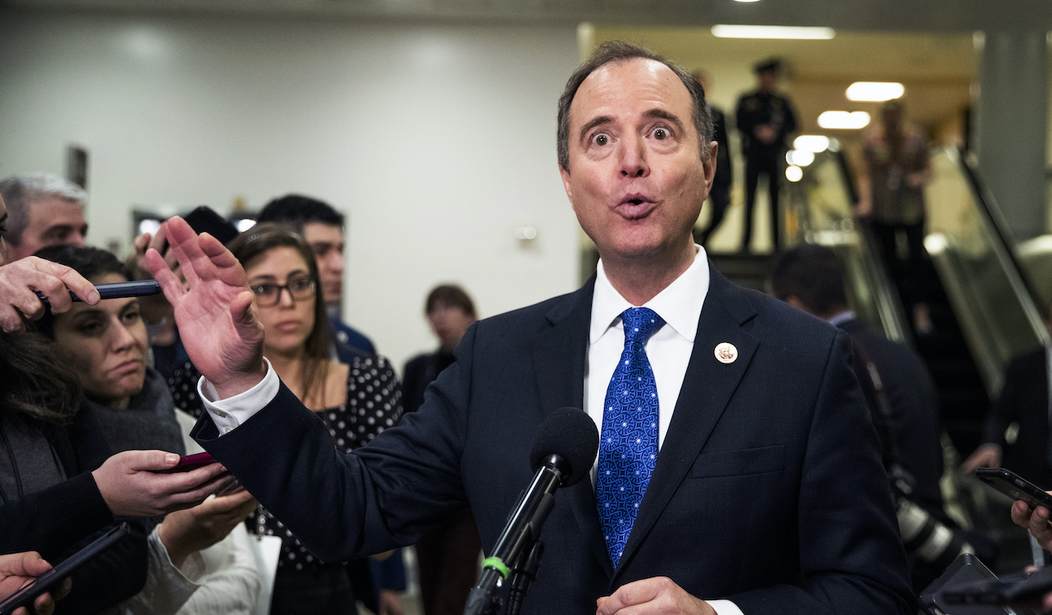Remember when new algorithms and/or Elon Musk’s pique over the tracking of his private jet resulted in the temporary suspension of journalists? The mainstream media (and others) shrieked over the Danger to Journalism, Democracy Dying in Darkness, and the corporate silencing of dissent and scrutiny on Twitter over seven-day suspensions. Musk eventually reversed them within a day, but media platforms warned that the new management at Twitter was a threat to the Republic, or something.
Oddly, though, all of the same outlets seem veeeerrrrry quiet about one key revelation in last night’s Twitter Files tranche. John wrote about the overall lessons of Matt Taibbi’s new release, but one point in particular requires its own focus. And that is Adam Schiff’s attempt as House Intel chair to ban a journalist from the Twitter platform entirely. And while previous Twitter management balked at it initially, they eventually suspended RealClearInvestigations reporter Paul Sperry:
28.“WE DON’T DO THIS” Even Twitter declined to honor Schiff’s request at the time. Sperry was later suspended, however. pic.twitter.com/9PX2Zw5Nzj
— Matt Taibbi (@mtaibbi) January 3, 2023
Say what? A sitting member of Congress demanded that a journalist get silenced on social media? That is an explicit case of attempted government censorship of the Fourth Estate, as Sperry himself noted last night in the middle of Taibbi’s tweet storm:
How is a Congressional leader demanding the banning of a veteran journalist from the nation's digital town square not state censorship?
— Paul Sperry (@paulsperry_) January 4, 2023
Perry is right about this. What authority does Congress have as a body, let alone a single member of Congress, to demand such an action? What jurisdiction does Congress have on social-media content at all? The First Amendment makes this point very clearly — Congress has no jurisdiction at all, let alone its individual members:
Congress shall make no law respecting an establishment of religion, or prohibiting the free exercise thereof; or abridging the freedom of speech, or of the press; or the right of the people peaceably to assemble, and to petition the Government for a redress of grievances.
Emphasis mine. Sperry clearly acted as a member “of the press” in his reporting at RCI. Even beyond that, he engaged in his right to free speech in reporting and commenting on politics, whether Schiff liked the content or not. And yet here we have a member of Congress demanding that a speech platform silence someone over their political point of view, a journalist working for a well-known media outlet.
Had Twitter execs shut down Sperry’s account on their own over his content, that would have been debatable but certainly within their authority as the owners of the platform. In fact, that’s exactly what the situation was when Musk temporarily suspended a handful of journalists for amplifying an account that invaded his privacy and arguably doxxed his family. Their employers and other media outlets didn’t bother with nuance at that time to parse out the difference between private and government action. They declared the temporary suspensions to be illegitimate, and a signal that Twitter was dangerous to free speech and a free press.
And yet, the Guild has remained very, very silent in the face of actual government censorship over content. Elon Musk suspending a few journalists was a crisis, but a House Intel chair demanding the silencing of his political opposition — which appears to have eventually succeeded — hasn’t raised even a throat-clearing question.
All this does is confirm the impression that our national media industry does not operate on principles. It operates for political gain.
By the way, this issue of government censorship goes way beyond one member of Congress. It goes beyond Congress itself. It even goes beyond the US, as Musk pointed out last night:
US govt agency demanded suspension of 250k accounts, including journalists & Canadian officials! https://t.co/kcEMMCzF7d
— Elon Musk (@elonmusk) January 3, 2023
The incoming Congress needs to fully expose these unconstitutional actions and violations of civil rights. Too bad the only chamber that could do so is currently eating itself over nothing much at all.








Join the conversation as a VIP Member